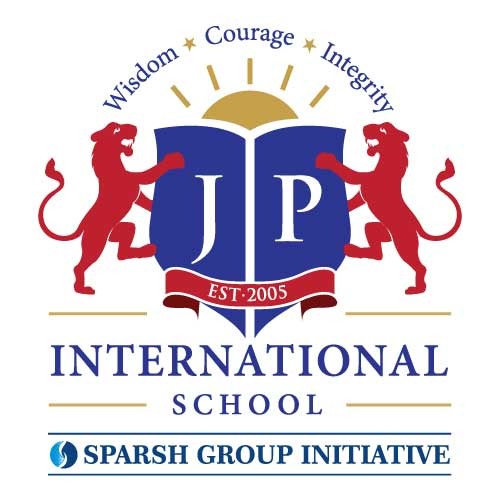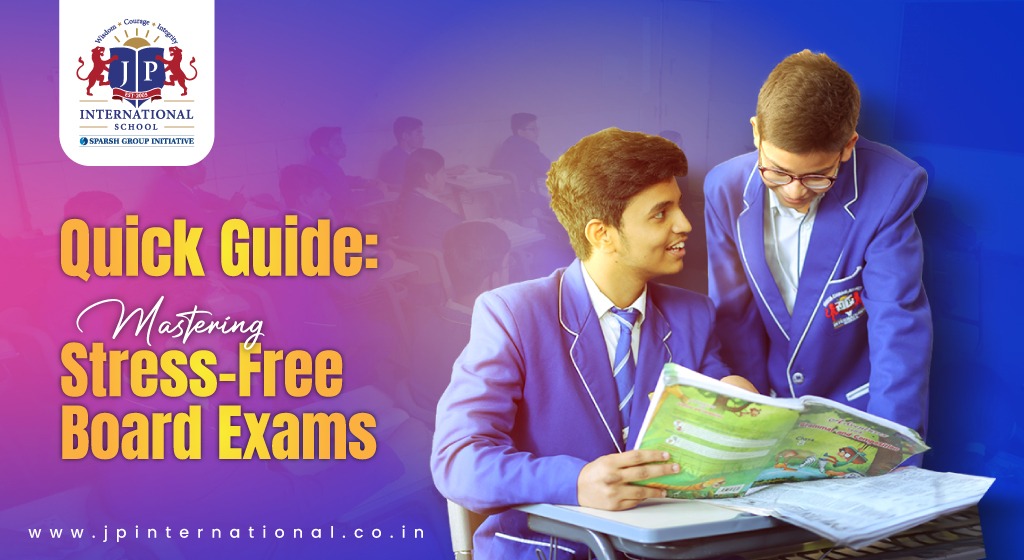

T:+91 7669-933-404
Email: [email protected]
Plot 3A, Sector Omega 1, Near Pari Chowk, Greater Noida, GB Nagar, Pin Code 201308


T:+91 7669-933-404
Email: [email protected]
Plot 3A, Sector Omega 1, Near Pari Chowk, Greater Noida, GB Nagar, Pin Code 201308


Board exams are indeed the single most crucial phase in a student’s academic progression, which is accompanied by expectations and stress. Mastering appropriate strategies can make exam preparation a positive experience. There are important recommendations listed in this guide to assist students to achieve successful stress-free preparation for their board examinations.
The first action plan that has to be undertaken with precision is an understanding of the syllabus and the model of the examination to be faced. Knowledge of these details helps students know what specific areas to focus on and how much time one should spend on them. It is, therefore, important to break the syllabus into manageable chunks that will reduce the feeling of being overwhelmed. An element of checking the list of topics that have been discussed and those that are yet to be discussed helps not to miss out on any important part of learning and revision.
A well coordinated and systematic study schedule is recommended for effective preparation.
• Divide specific time periods for each type of lesson.
• Use short intervals to ensure you do not spend too much time on one section and burn out.
• Practise working through interruptions and disturbances to some extent.
It is possible to have daily or weekly oriented goals that will help a student understand that he or she is doing something right and it is necessary to continue the routine. Difficult subjects should therefore be scheduled early in the morning to increase chances of the information being imprinted in our brains. It should also be noted that, reading and reinforcement time as well as mock exam should also be incorporated in the schedule.
Mock tests and past question papers are invaluable resources for board exam preparation. They help students:
Familiarise themselves with the question format and time constraints.
Identify strengths and areas requiring improvement.
Build confidence by simulating exam conditions.
Regular practice with these tools ensures better time management and reduces exam-day anxiety. Reviewing mistakes from mock tests allows students to refine their approach and focus on weak areas.
Understanding concepts is more important than rote memorisation. Encourage students to:
Ask questions to clarify doubts.
Relate theoretical knowledge to practical applications.
Use visual aids like diagrams and flowcharts for better retention.
Conceptual clarity not only helps in scoring well but also builds a strong foundation for future learning. Collaborative learning through group studies can further enhance understanding of complex topics.
Good health plays a vital role in stress-free preparation. Students should:
Follow a balanced diet to ensure proper nutrition.
Get adequate sleep to stay alert and focused.
Engage in physical activities like yoga or light exercise to reduce stress.
Practices like meditation and mindfulness can enhance concentration and emotional resilience.
Staying hydrated and taking short walks during breaks can help maintain energy levels throughout the day.
Students should never hesitate to seek help from teachers, peers or family members. Group studies can provide fresh perspectives, while discussing doubts with teachers ensures clarity. Emotional support from family can also be a great stress reliever.
Many schools organise doubt-clearing sessions or extra classes for board exam students. Attending these sessions can offer additional guidance and boost confidence.
A positive mindset can make a significant difference in performance. Encouraging self-belief and avoiding comparisons with others can help students focus on their own progress. Regular self-affirmations and celebrating small achievements can further boost confidence.
Visualisation techniques, where students imagine themselves successfully completing the exam, can help reduce anxiety and build self-assurance.
Mastering stress-free preparation for board exams is achievable with a blend of smart planning, consistent efforts and emotional well-being. By adopting the strategies outlined above, students can navigate this crucial phase with confidence and ease. Schools like JP International School understand the importance of holistic development and provide the guidance and resources students need to excel.
From structured study plans to supportive teachers, such institutions ensure students are well-prepared for the challenges of board exams. With the right approach and support, students can turn the challenge of board exams into an opportunity for growth and success. J P International School continues to emphasise the value of a balanced approach, helping students prepare not just for exams but for lifelong learning.
Create a balanced timetable with dedicated slots for each subject, breaks for rest and time for revisions and mock tests. Revisit this routine once in a while to make necessary adjustments.
- JP International School19 April 2025
Whether through co-curricular activities, international exposure, or digital learning platforms, ...
12 April 2025
JP International School makes students future-ready by imparting 21st century skills through the ...
5 April 2025
A solid education from school creates opportunities for students to grow into confident, responsi...
29 March 2025
Technology allows students' everyday journey, be it in academics or outside of academics, to be t...
22 March 2025
STEM education prepares students for healthcare careers by combining biology, chemistry and physi...
 28 November 2024
28 November 2024
.jpg) 27 November 2024
27 November 2024
 8 December 2022
8 December 2022
